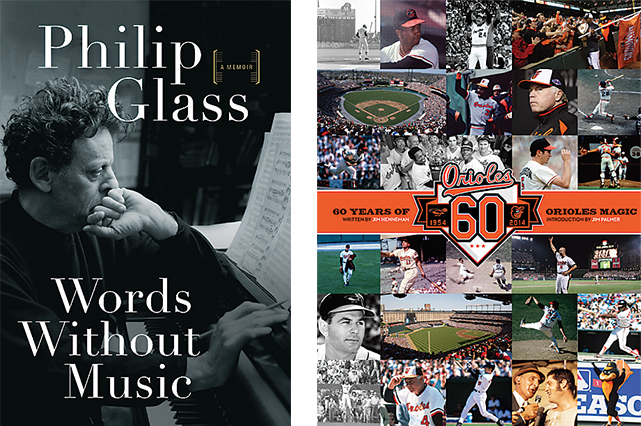Arts & Culture
Book Reviews: August 2015
The latest from Philip Glass and Jim Henneman.
Words Without Music
Philip Glass (Liveright Publishing Company)
It’s clear from his memoir that composer Philip Glass always knew he would walk a different path. During his early years in Baltimore, he found a way to crash his brother’s piano lessons, adding them to his own flute studies at the Peabody Conservatory of Music. At 15, he convinced his parents, an English teacher-turned-librarian and a record-store owner, to let him attend the University of Chicago, then Juilliard, and he never looked back, despite their concern that being a musician was not a legitimate career. His inauguration into New York’s art scene and travels in Europe and Asia followed, as did studies with world-renowned teachers and musicians, including Indian sitar player Ravi Shankar and French composer and conductor Nadia Boulanger. Throughout, Glass kept his sense of self. He writes that he told Boulanger he wouldn’t be coming back to study with her after a year, going against her wishes. And he disagreed with composer Aaron Copland so vehemently that it ended a composition lesson.
What makes Words Without Music so fascinating is its look inside the man considered one of the most influential composers of the late 20th century. His haunting, trance-like music has graced opera, theater, movie scores, symphonies, and string quartets, but Glass himself has remained something of an enigma. His candid recounting of his road to success offers much insight and his discussions of music and composing are must-reads for any avid music fan. Even if Glass isn’t your particular cup of tea, his recollections of his early days provide wonderful windows into New York’s intellectual scene, where he found companionship and inspiration among simpatico artists, such as writers Allen Ginsberg and Doris Lessing, artists Chuck Close and Richard Serra, and musicians Leonard Cohen and Patti Smith. Plus, Glass’s tales of Baltimore, his father’s record store, and life in his big Jewish family—which includes This American Life’s Ira Glass—are engaging. His descriptions of his father’s violent reactions to shoplifters are disturbing but provide some welcome black comedy, as well. His closing reminiscences of childhood—from haircuts at the neighborhood barbershop to learning to ride a bike around the reservoir in Druid Hill Park—are so tenderly told that they might contend for some of the best parts. By its end, Glass’s memoir has provided a glimpse into a great mind, and shown what can happen when you create your own destiny. —GS
Baltimore Orioles: 60 Years of Orioles Magic
Jim Henneman (Insight Editions)
This comprehensive coffee-table tome is more than a mere recounting of the Orioles’ glory days. It’s the rare sports book where even serious fans of the local nine will find meaningful surprises, including never-before-seen photos from the archives, culled by O’s Alumni Program director Bill Stetka. Beyond the pictures, there are also replica “artifacts” inside, including pullout copies of the official letter granting Baltimore membership into “The American League of Professional Baseball Clubs,” vintage O’s postcards, a throwback scorecard from the first game at Memorial Stadium, and an early scouting report on a ballplayer from Little Rock named Brooks. Overall, the glossy photographs, anecdotes, and stories—about longtime O’s batboy Jay Mazzone, who didn’t have hands, for example—pop off the pages. One reason is that author Jim Henneman literally grew up with the team. Now an O’s official scorer, he worked in the clubhouse as a teenager before landing a job covering the team for the Evening Sun after college. —RC
